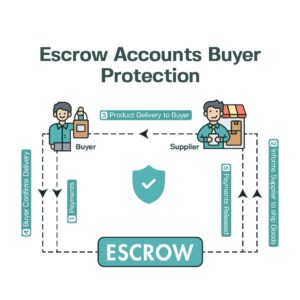
Escrow accounts are a financial instrument under which a third party holds an asset or escrow-based fund on behalf of two other parties in the process of completing a transaction. This financial tool has been extensively used globally by different economic sectors to increase transparency and accountability. In addition, the financial model is relevant to the real estate investment industry as well. Pakistan’s real estate investment industry suffers from a lack of transparency and accountability. The sector is tarnished with malpractices like under-invoicing of property prices and massive speculation, making real estate a difficult investment option. Buyers in the real estate sector have often been ripped off from their life savings as developers collect funds, misuse them, and are not held accountable due to non-transparent dealing. The escrow account system is a possible solution to the problem of Pakistan’s real estate sector as it can create transparency and accountability between the buyer and seller of property by ensuring that funds are only released completely once the buyer has received the product according to the advertised specification.
How Dubai has used escrow accounts to protect businesses and consumers
 Dubai managed to attract an enormous amount of investment into its real estate sector. The implementation of the much-awaited Trust Account law in 2007 was an important development as it won peoples’ confidence in the country’s real estate sector. The Trust Account Law requires that all funds received by real estate developers for a property must be administered through an escrow account opened with a designated bank. The banks and financial institutions certified are called escrow account trustees, and they act as the third party between the buyers and sellers. Banks such as the HSBC, Standard Chartered, Tamweel, and Amlak have already been certified to account trustees.
Dubai managed to attract an enormous amount of investment into its real estate sector. The implementation of the much-awaited Trust Account law in 2007 was an important development as it won peoples’ confidence in the country’s real estate sector. The Trust Account Law requires that all funds received by real estate developers for a property must be administered through an escrow account opened with a designated bank. The banks and financial institutions certified are called escrow account trustees, and they act as the third party between the buyers and sellers. Banks such as the HSBC, Standard Chartered, Tamweel, and Amlak have already been certified to account trustees.
The initiation of escrow accounts means that issues related to real estate developments will be scrutinized closely by authorities like the Real Estate Regulatory Authority (RERA) of Dubai. The RERA is a government body that operates under the Dubai Land Development (DLD). RERA will not only act as an extended third party in the escrow model, but will also help identify all administrative bottlenecks, delays, lack of funds, misappropriation, and other issues. In addition, the developers are registered with the DLD, which means that buyers know that developments are conducted only by certified and reputable developers. A transparent mechanism will cancel the registration of developers that fail to perform.
The Real Estate sector is being regulated in UAE and many developed countries worldwide to protect buyers’ rights and interests. Its implementation in the emirates has alleviated the reputation of its real estate sector in the global market.
Why Pakistan needs escrow?
There is a common practice in Pakistan that whenever massive funds are collected from the general public in real estate development, their focus starts to shift to other activities; in short, they are used for personal gains. In addition, the complex and lengthy procedures add to the misery of the common people who had been ripped off by the cunning developers. The same goes for overseas Pakistanis, whose remittances for real estate investments end up being trapped as developers run away with the investor’s funds scot-free. According to research on Pakistan’s land disputes, there are 1.8 million pending court cases in Pakistan, with a majority of them being related to property disputes. Some experts believe this figure is around 50-70%, which means a stringent need for transparency and accountability in Pakistan’s real estate sector.
Experts believe that Pakistan needs to work on an investment framework like an escrow account to protect both the buyers and sellers of property. There is a huge demand for this service in the property market as many buyers and sellers desperately need transparency.
The real estate sector is a store of global wealth and is considered a national asset. Malpractices like under-invoicing of property and non-transparent investment practices can make real estate a store of black wealth. Traditionally, three different property valuation tables exist in Pakistan: DC rate, FBR rate, and Market rate. All these rates have a considerable difference in valuation which creates grounds for under-invoicing and other malpractices.
Under its recent review of the Financial Action Task Force (FATF), Pakistan has been directed to create transparency in its real estate sector. The government needs to reform its regulatory framework to enhance transparency and accountability in its real estate investment sector to get Pakistan off the grey list and protect its buyers from undue distress.

Leave a Reply